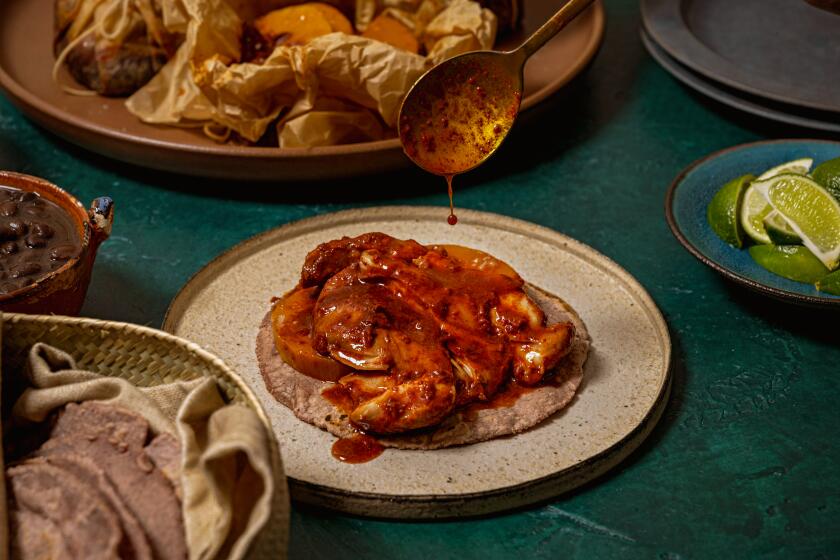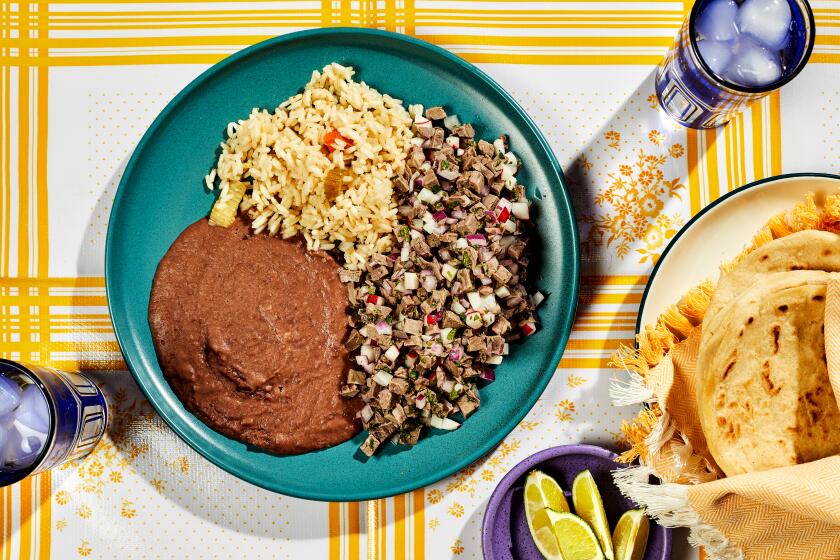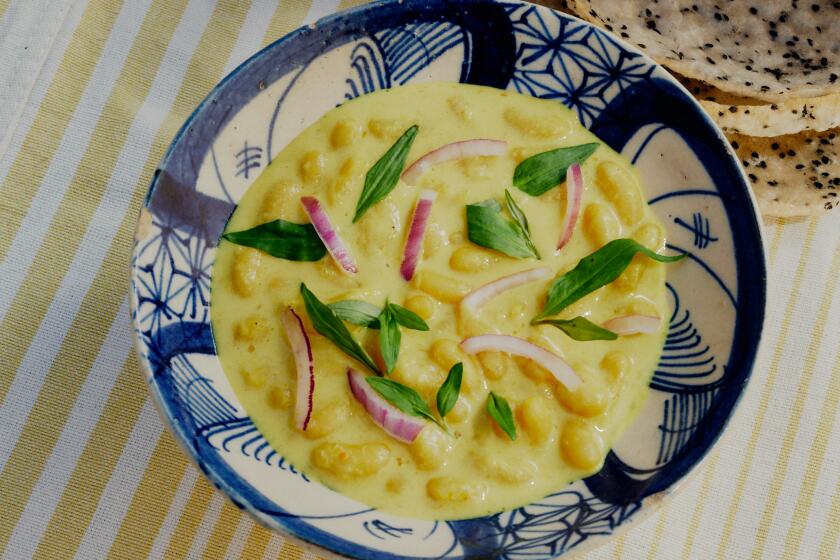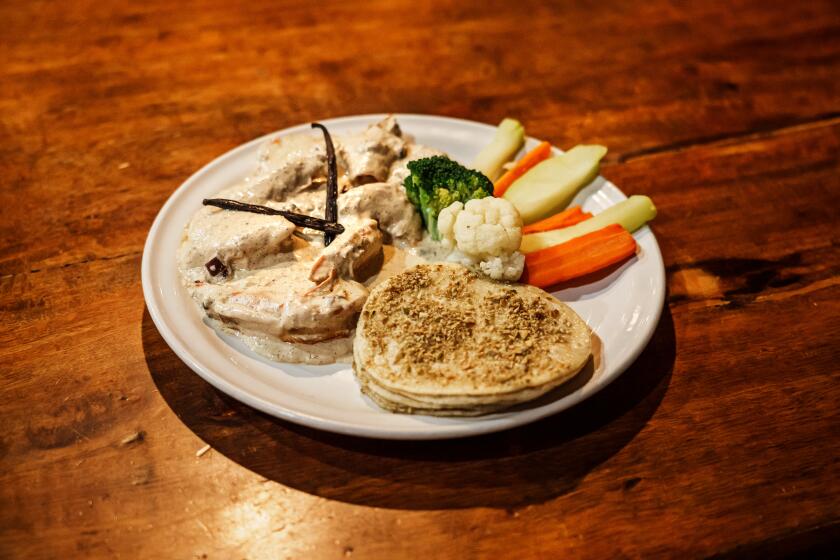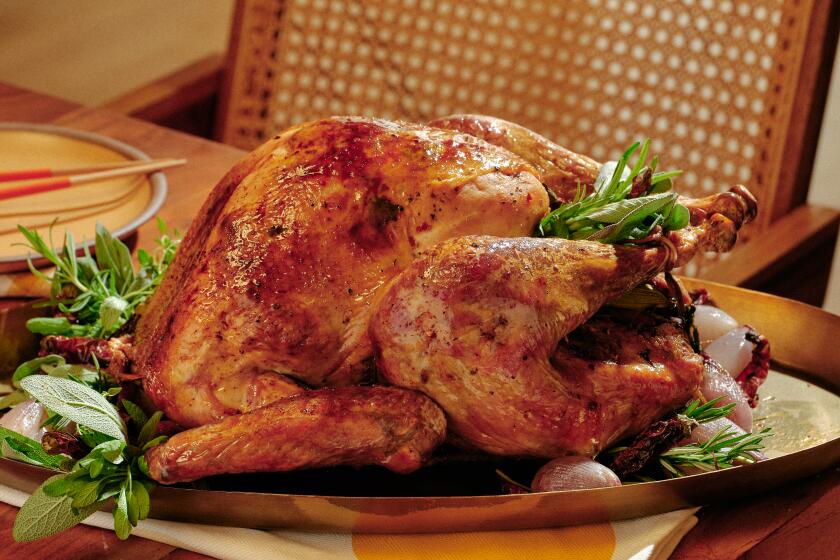Fire Station 112 mostaccioli with pot roast, meatballs and sausage
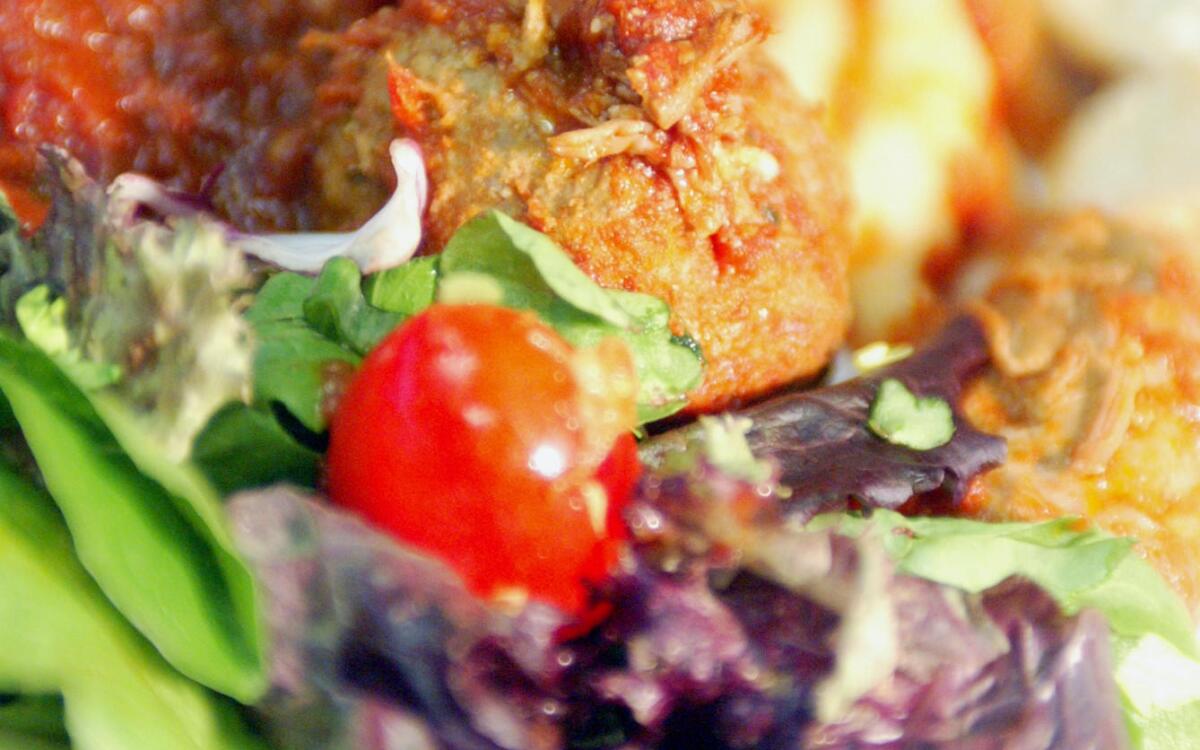
After years of lugging a cliche around in the back of your mind, you wind up with a choice. You can accept the truth of it, and be no worse off. Or you can finagle a way to, ah, investigate.
So do firefighters really cook as well as weâre told?
Thanks to your wife, you finally have a chance to put this old wheeze to the test. It begins at a âcasino nightâ fund-raiser for the South Bay Sunrise Rotary Club. At a mock horse race, she picks a 70-to-1 longshot and, ding-dong, you are the happy winner of dinner for four at -- and letâs give these guys credit, please -- the very best the LAFD has to offer, Station 112.
âGreat,â says Battalion Chief Louis A. Roupoli. âYou wonât be disappointed.â
The Los Angeles Fire Departmentâs Marine Task Force Station 112 in San Pedro is distinctive for several reasons. One of them is that itâs home to âthe most powerful fireboat in the world,â about which we will learn more. Also, the fire station was built recently in one of those fortunate interludes between civic budget crises, so that you will be eating from a Wolf industrial stove in a glass-fronted mess hall with a waterfront view. For another thing, crewing on a harbor fireboat is highly desirable duty. The politics of seniority thus assures that there wonât be any rookies in the kitchen.
âNobodyâs learning here,â you are advised.
A few introductory words about the cliche of firefighters and food: Thumb through books written on the subject and you realize how deeply rooted this idea is in our culture. In the comfortable small-town imagery of an emerging nation a century ago, the volunteer fire hall was host to family-style community feasts on Sunday. Later, with the rise of professional firefighters, these kitchens became the home away from home for crews who stood 24-hour shifts.
Still, there are reasons to wonder. The patois of the firehouse cook is full of words like âgrubâ and âno nonsenseâ and âall-American.â How many sins of the ordinary can be camouflaged in such language?
So you inquire: Chief, whatâs on the menu?
âWeâll do something with a marinara sauce,â Roupoli replies, blithely.
Oh.
He offers a context: His family settled in San Pedro four generations ago at the beginning of a sizable migration of Italians to the north side of the Los Angeles harbor. The Roupoli name threads its way through the history of San Pedro and still retains its ethnic pride. So naturally, dinner will be pasta.
A turn at the stove
If you happen to rub shoulders with the foodie crowd, however, marinara sauce conjures up dubious thoughts: Say, supper at the Cleaversâ house with Wally and the Beav.
So you turn up the pressure a little. You ask, will this dinner hold up to scrutiny of a larger audience?
âItâs all in the sauce,â Roupoli replies, unfazed.
As happens, this Sundayâs rotation -- every firefighter takes a turn at the stove -- has John Donato cooking. An 18-year veteran of the LAFD, Donato is also a native of San Pedroâs Italian American community. He recalls growing up with the ritual gathering of extended family on Sundays for pasta, everybody helping out. It was here that a young boy began to understand the significance of food to the cohesiveness of a clan.
A good sign: The door to station 112 opens and you are enveloped in the aroma of garlic, fresh basil, sweet onions, crushed tomatoes and meat put to the heat. Mind you, this is a large building. It encases a 105-foot, 200-ton fireboat, a pumper engine, a foam tender truck, a paramedic ambulance, a handball court, a dormitory -- and the kitchen is at the far end from the front door. Donato has filled a quarter-block of San Pedro waterfront with the welcoming smells of boyhood Sundays.
The rite commenced the same as always. The chop-chop-sizzle of diced onions, minced garlic, ripe olive oil and flame is to comfort food what the Barcalounger is to grandpaâs tired back -- the beginning of a promise of better things to come.
Donato holds a stance in front of the stove, but his movements are nonchalant, automatic. His recipe requires thought only in recounting, not in execution. He is cooking with his nose.
He jabs a spoon into the liquid, which is a darker shade of red than the fireboat down the hall. But the spoon wonât go to the bottom. Something here isnât familiar.
At the center of Donatoâs simmering sauce is a boneless beef shoulder roast the size of a pumpkin. Yes, there is a bucketful of Roupoliâs Parmesan meatballs in there too, garnished with a pigletâs worth of garlic sausages from a local Italian butcher. But the roast, dimpled with still more garlic, commands the pot.
The sauce went on at midday. It will simmer all afternoon over the gentlest of flame, barely enough to raise lethargic bubbles. Simultaneously, meats are allowed to marinate and braise. The mingling of so many juices cannot be hurried, and why would it?
Donato is cooking with his eyes now. Flavors concentrate and mellow as the sauce thickens. He gauges its strength from dribbles off his stirring spoon.
Perhaps when youâre not looking, he is sampling a taste. But you donât catch him at it. Sunday feasts in the style of San Pedroâs Italian American tradition are elongated affairs: Much is derived from the arousal of hunger when exposed to a half-day of sensory anticipation.
With such a menu, there is a practical consideration for the firefighter too. This dinner could be deferred without penalty in the event of an alarm. That wouldnât be the case with steaks or a roast.
âJohnny Dâ -- thatâs what firefighters call him -- is regarded as one of the best cooks on the 15-person âCâ shift. And that makes him a contender for one of the best cooks in the department, right?
Heads nod. âWe eat as well as anybody, and better than most,â says Capt. E.D. Eliot. âThe challenge is this thing.â He points to what could be a pot belly if he didnât exercise 45 minutes a day to keep his metabolism apace of his appetite.
A bushel of mostaccioli is unwrapped to await the boiling water. Itâs no surprise that Eliotâs daily workout is mandatory, not voluntary, at the LAFD.
There is bustle in the kitchen now. A compact man with a military mustache, Donato has sprouted a crease on his forehead. No, heâs not worried about impressing strangers. âYou can say what you want -- itâs these guys who are hard to please,â he says, pointing a thumb to the firefighters who now saunter into the kitchen to check.
Each member of the âCâ shift pays into a kitty to cover costs of food. The department does not feed them. They bought this dinner, and theyâre making sure.
Donato begins chopping greens for a salad. The rest of the stationhouse turns out for a training session. Fireboat Two, the pride of the departmentâs harbor fleet and the first line of defense against disaster at the nationâs second busiest port, noses out of the station.
Last year, this vessel brought the LAFD into the 21st century. Designed by the stationâs own firefighters and built in Seattle, the boat can pump roughly 25 times as much water as a standard wheeled fire engine. Put another way, it could fill a swimming pool in 10 seconds. At full power, it can shoot a stream of water over the Vincent Thomas Bridge.
The main event
Afloat in the harbor channel, the pumps are engaged and Fireboat Two disappears in a shimmering Fourth of July fountain of seawater.
âAttention! Five-minute warning,â a voice booms over the stationâs P.A. system.
Donato has deconstructed his sauce. The roast, now flaky and crumbling, has been carved and set in the middle of a serving pan, surrounded by meatballs and sausage. He lubricates the vat of mostaccioli with sauce. The salad is placed on a cupboard with eight varieties of bottled dressing. Others have pitched in. Bread from a local bakery is removed from the warming oven and sliced.
âReport to the galley! Itâs time to dine.â
Without a wasted step, without anything resembling a line or a delay, with the perfect coordination of people trained to work alongside one another in dark and smoky spaces in moments of urgent crisis, the buffet is, clang-clatter, served. The display of efficiency alone is worth a 70-to-1 longshot bet.
Then quiet.
A methodical tinkle of dinnerware, the rhythmic mastication of 15 jaws, and hours of work vanish. Plates shine. Your 3-year-oldâs plate is empty, the longshot-bettorâs plate is empty, your friendâs 10-year-old has finished her plate too. Only you have anything left. Youâve fallen behind because you thought to jot down a note about never allowing yourself to come between firefighters and their stomachs. You quickly replace the pencil with a fork to catch up.
âGood work, Johnny D.â The cook doesnât bother to ask how you liked dinner; the people who count express their approval.
To be honest, this is not how you would have eaten the dinner. You could have extended the meal for an hour, and perhaps consumed less.
The roast turns out to have a firmer bite than you would have expected, beef worth a more considered approach. The meatballs are chunky in texture, blessedly far from overworked and mealy. They could go down in small bites as well as by the mouthful. The sausages hold on to their liquid all afternoon. The stout mostaccioli comes out of that water precisely at that instant before it would have lost its backbone. And the sauce? Dark, velvety rich, well-aged, and just the vaguest bit sweet -- âthatâs the grated carrot, it cuts the bitterness,â Roupoli says.
Alas, the meal suffered an unavoidable omission.
Perhaps to compensate, Roupoli describes the wine that he makes and bottles each year for those days when heâs not running the battalionâs nine stations and five fireboats. His conversation only serves to remind you of the sacrifice that front-line defenders are called upon to make every workday. Thatâs not said lightly. Just outside the mess-hall window, a good share of the nationâs economy travels, and with it the threat of mishap or terrorist attack.
As for the cliche: Yes, firefighters can cook, and with a vengeance.
To the extent that Donato is representative, their pride in the kitchen is well deserved. All-American grub, Italian style -- shared with an old-fashioned spirit of community.
But, lads, you might want to slow down. Rush when the alarm rings, but no need to gulp your food. As your mothers surely told you, not everyone is lucky enough to savor a dinner like this one. One other thing: bottled salad dressing?
Sauce
Cook the onions and minced garlic in the olive oil in a large roasting pan over medium heat (using 2 burners, if necessary) until the onions turn transparent, 4 to 5 minutes.
Make 12 slits evenly over the surface of the roast and insert a sliver of garlic into each.
Add the roast and garlic sausages to the pan, then the tomatoes, breaking them up with your hands as they go in the pan. Add the carrots, basil, salt and pepper. Bring to boil.
Meatballs
Place the bread, eggs, parsley, garlic, Parmesan, pine nuts, salt, pepper and ground beef in a large mixing bowl. Gently combine until ingredients are blended. Shape the mixture into 24 (2-inch) meatballs.
Add the meatballs to the sauce and reduce the heat to a simmer. Cover the roasting pan tightly with foil and cook 15 minutes longer. Adjust the foil so that the pan is loosely covered and continue to simmer over very low heat until the meat is fork tender but not dry, 3 1/2 to 4 hours.
Assembly
Cook the pasta in boiling salted water until al dente; drain.
Remove the meat from the sauce using a slotted spoon and tongs. Skim any excess fat from the sauce. While the pasta is cooking you may want to reduce the sauce to thicken it, 10 to 15 minutes.
Carve the roast and assemble the slices on a serving platter with the sausages and meatballs. Mix a portion of the sauce, about 3 or 4 cups, with the mostaccioli and serve the remaining sauce on the side.
Get our Cooking newsletter.
Your roundup of inspiring recipes and kitchen tricks.
You may occasionally receive promotional content from the Los Angeles Times.










